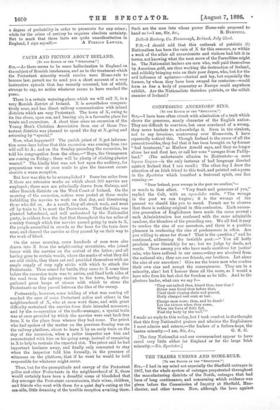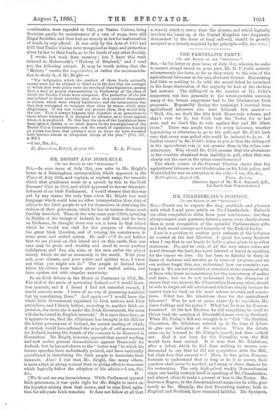THE TRADES UNIONS AND HOME-RULE.
[To TEE EDITOR OF THE " SPECTATOR:9 SIR,—I had in my mind not especially the Sheffield outrages in 1867, but the whole system of outrages perpetrated throughout the manufacturing districts of the North, outrages that had been of long continuance, and concerning which evidence was- given before the Commission of Inquiry at Sheffield, Man- chester, and other towns. Now, although the laws against
combination were repealed in 1825, yet Trades Unions, being Societies partly for maintenance of a rate of wage, were still illegal Societies, and thus had no remedy at law for malversation of funds by any official. It was only by the Acts of 1869 and 1871 that Trades Unions were recognised as legal, and protection
given by law to their funds, as to the funds of any other Society.
I wrote last week from memory ; but I have this week referred to Molesworth's "History of England," and I send you the following extract. It may be worth noting that the 4‘ History" carries the imprimatur, or rather the recommenda- tion to study it, of Mr. Bright :— " The indignation which the conduct of these Sends naturally rouses must not be allowed to blind us to the fact that the outrages -of which they were guilty were the results of class legislation, arising from a want of proper representation in Parliament of the class of which the Trades Unions were composed. The protection of the law was refused to those societies, even when they confiued themselves to objects which were clearly legitimate ; and the consequence was that they attempted to compass their aims by means which were illegitimate. If the law would not protect them, they would defy the law. Thus it always happens that injustice is as pernicious to those whose interests it is designed to advance, as to those against -whom it is employed. To this fact the eyes of the Legislature have -been opened, thanks in no small degree to the investigations of the Trades Union Commissioners ; and the result of legislation founded -on justice has been that outrages such as those we have recorded have become almost or altogether things of the past." (Vol. III., p. 335.)
—I am, Sir, &c.,
St. Barnabas, Bristol, August 4th. E. A. FULLER.



































 Previous page
Previous page